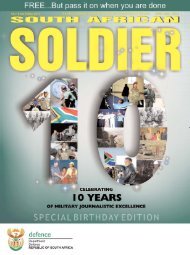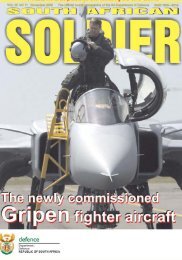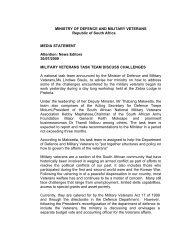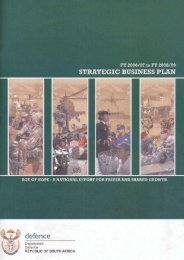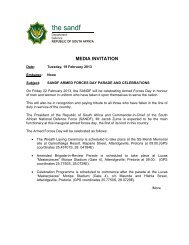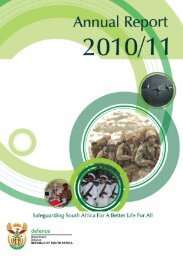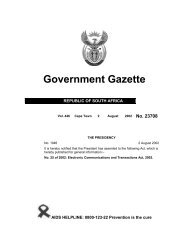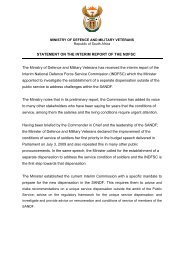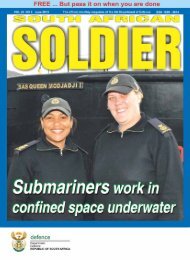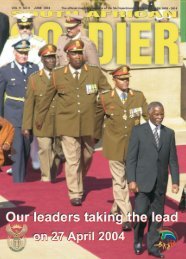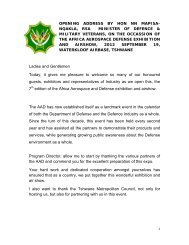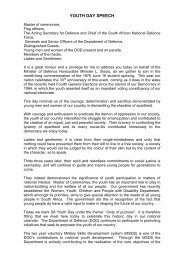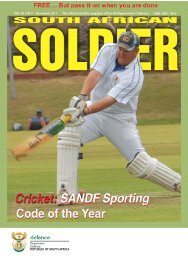Chapter 2 - P rogramme 1 - Department of Defence
Chapter 2 - P rogramme 1 - Department of Defence
Chapter 2 - P rogramme 1 - Department of Defence
You also want an ePaper? Increase the reach of your titles
YUMPU automatically turns print PDFs into web optimized ePapers that Google loves.
| <strong>Chapter</strong> 8 - P<strong>rogramme</strong> 6: <strong>Defence</strong> Intelligence |<br />
and operational planning. <strong>Defence</strong> Intelligence<br />
provided an improved geospatial service for force<br />
preparation and the conduct <strong>of</strong> intelligence. The<br />
improvements were specifically in the fields <strong>of</strong><br />
database development, quality assurance initiatives,<br />
map-data acquisition, the development <strong>of</strong> training<br />
p<strong>rogramme</strong>s, commercial satellite data and an<br />
improved technological base.<br />
<strong>Defence</strong> Intelligence has made a concerted effort<br />
during the past year to improve its human resource<br />
composition. This included a recruitment drive that<br />
concentrated on rejuvenation and improvement<br />
<strong>of</strong> representivity. Progress was made when two<br />
African female Colonels were appointed to the rank<br />
<strong>of</strong> Brigadier-General within <strong>Defence</strong> Intelligence,<br />
whilst a recommendation has been made to<br />
promote all qualified black Lieutenant-Colonels<br />
within <strong>Defence</strong> Intelligence (both male and female)<br />
to the next rank level <strong>of</strong> Colonel in available posts.<br />
These promotions will greatly improve the race<br />
imbalance in the Colonel rank level. The Division<br />
has continued to experience an outflow <strong>of</strong> specialist<br />
staffs and an initiative was instituted under Chief<br />
Human Resources to investigate the remuneration<br />
packages amongst various national intelligence<br />
services in order to counter this outflow. The<br />
investigation into the SANDF’s remuneration<br />
packages in order to retain scarce skills within<br />
the SANDF is a key concern factor to <strong>Defence</strong><br />
Intelligence’s rejuvenation strategy. The reduction<br />
in personnel has resulted in a reduction <strong>of</strong> the<br />
required skills levels <strong>of</strong> <strong>Defence</strong> Intelligence staff<br />
members. This last-mentioned reduction impacted<br />
on service delivery, where objectives that were set<br />
by the different subdivisions could not always be<br />
fully achieved. Personnel development p<strong>rogramme</strong>s<br />
that address the shortcomings in personnel skills<br />
have been implemented, but in some instances the<br />
non-availability <strong>of</strong> members due to other training<br />
commitments further aggravated this situation.<br />
During the past year, progress was made in the<br />
empowerment and pr<strong>of</strong>essional development <strong>of</strong><br />
members. The long-term project to improve the<br />
analytical ability <strong>of</strong> desk-level intelligence analysts<br />
saw 41 learners attending an introduction to analysis<br />
p<strong>rogramme</strong>. This was expanded to the strategic<br />
level, where 34 members attended a Strategic<br />
Analysis Course presented by the Intelligence Study<br />
Centre <strong>of</strong> Australia in South Africa and 19 members<br />
attended an intelligence management p<strong>rogramme</strong>.<br />
Much progress was made with the revision <strong>of</strong><br />
the registration <strong>of</strong> the National Qualifications<br />
Framework (NQF) at Level 4. The intention is to<br />
Annual Report FY 2007 - 2008 156<br />
| <strong>Department</strong> <strong>of</strong> <strong>Defence</strong> |<br />
enhance the competency <strong>of</strong> intelligence functionaries<br />
at the junior level while the National Certificate in<br />
Statutory Intelligence on NQF Level 5 was revised.<br />
The certificate will enhance the pr<strong>of</strong>iciency <strong>of</strong><br />
intelligence functionaries at the junior levels. The<br />
Further Education Training Certificate at NQF Level<br />
4, as well the three diplomas (Analysis, Counter-<br />
Intelligence and Collection) on NQF Level 6, were<br />
re-registered for the next three years, providing the<br />
ETD providers with the opportunity to develop the<br />
required learner p<strong>rogramme</strong>s.<br />
Project MOSOLA, the project to optimise <strong>Defence</strong><br />
Intelligence’s structure, was initiated and will<br />
be finalised by September 2008. The condition<br />
<strong>of</strong> the <strong>Defence</strong> Intelligence Headquarters<br />
infrastructure continued to deteriorate as only<br />
day-to-day maintenance was conducted due to the<br />
reprioritisation <strong>of</strong> allocated funds. This increases<br />
the risk that the permanent infrastructure would not<br />
adhere to Occupational Health and Safety (OHS)<br />
requirements in the near future.<br />
The Counter-Intelligence doctrine is in the final<br />
draft stage and will be submitted for approval.<br />
The Division is challenged by the need to train<br />
its members in various languages spoken on the<br />
Continent. Members who deploy on the Continent<br />
are required to be conversant in key locally-spoken<br />
languages in the operational area. Members were<br />
identified for training and have already started to<br />
undergo specific language training to address this<br />
need.<br />
Clearly, <strong>Defence</strong> Intelligence has played a pivotal<br />
role in several national and continental initiatives to<br />
promote peace and security and will continue to do<br />
so, aided by the strong networks built within Africa<br />
and with other State structures.<br />
Purpose<br />
The <strong>Defence</strong> Intelligence P<strong>rogramme</strong> provides<br />
a defence intelligence and counter-intelligence<br />
capability.<br />
Measurable Objectives<br />
To defend and protect South Africa by providing<br />
military intelligence and counter-intelligence<br />
products and services that meet the requirements<br />
<strong>of</strong> Government.



